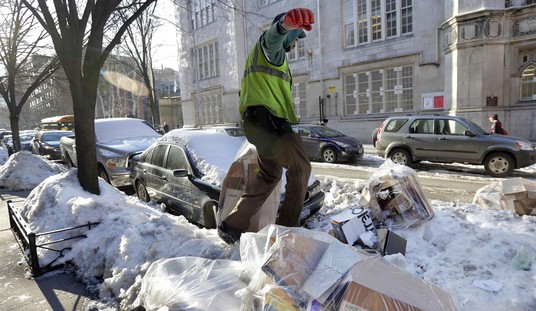“From the picture on his blog, Mr. Hanscom looks like he is about 23.”
So begins a critique of my most recent PJM article on parenting. First some background on why I’m taking that guess about my age as a compliment.
It’s hard to admit, but I’ve been carded while trying to purchase a lottery ticket.
Twice. In the same store. By the same employee.
It should be noted that the legal age to play the California Lottery is 18. My 18th birthday was in 1994, and I bought those scratch-off tickets last year.
Doubt about my real age has not only proven to be an obstacle at the local Longs Drug Store. In fact, my behavior has actually been influenced by the anticipation of the dreaded double take.
For example, it’s helped me avoid certain vices. One of the main reasons I don’t gamble much is that security usually approaches me the moment I step foot into a casino.
“Surely, he’s exaggerating!” you might be saying. Well, consider the following. During my years as a substitute elementary school teacher, visitors to the classroom often mistook me for a student.
It should be obvious by now that I look young. While my eyeglasses seem to add a few years to most people’s estimation of my age, they don’t propel me beyond the teenage years. But I’m starting to understand that growing up is not entirely beyond my control. After recently re-reading Joseph Epstein’s classic Weekly Standard essay, “The Perpetual Adolescent,” one person came to mind. Me.
Epstein begins his piece by pointing out that in the 1940s men wore suits to baseball games. He writes: “How different from today, when a good part of the crowd at any ballgame, no matter what the age, is wearing jeans and team caps and T-shirts.” As I write this essay from the Pajamas Media office in El Segundo, I’m wearing jeans, a T-shirt, and the same type of Adidas shoes that my 15-year-old brother owns.
Still, I shouldn’t be too hard on myself. Epstein writes that when he was young, “by 30, one was supposed to be settled in life: wife, children, house, job.” On the cusp of 31, I’ve got a wife, no children, a condo, and a job. Pretty darn close.
But not close enough, which takes me back to the post above. After incorrectly (but more accurately than most) guessing my age, Jenny Hatch advises me to wait about 25 years and then: “Find a nice young woman, get married, and then welcome a few screaming balls of fury into your life, and after those children have hit 18, please, share with us your views on how to properly parent the well adjusted child.”
I responded to Hatch by email, making her aware of the fact that I’ve been married for more than five years. But she’s absolutely right that I don’t yet have children. Helping my parents out with a younger brother 15 years my junior and teaching hundreds of kids over the years is no substitute for life’s most difficult task: raising children of your own.
So I’d like to take this opportunity to credit all the parents I criticized in those parenting pieces with at least giving it a try.
While American fertility may be a little above the replacement rate at 2.1 children per woman, my friends and I don’t feel remotely ready to have children. Whether we care to admit it or not, we’re a lot like Western Europeans in this regard: We want to live the good life, unencumbered by dirty diapers and tantrums at toy stores.
There’s much more to it than that, of course. Writing in the Washington Post last year, Robert J. Samuelson provided some reasons for declining birth rates in the West: higher incomes, later and fewer marriages, more divorces and contraception. If the marriage and celibacy rates (the first one low, the second one nil) of the people on my Yahoo buddy list are anything to go by, these usual suspects definitely play a big role in my generation’s rush to wait.
Speaking of “waiting,” the fact that young men no longer have to wait to get married before having sex is another reason so many of us don’t know how to hold a baby in our arms. The truth is that guys today often feel like children in a candy store: So little time, so much to choose from. Much has already been written on how feminism and the sexual revolution ended up hurting women in the long run. The idea that men and women are no different from each other sexually has had some devastating effects. Wendy L. Walsh put it best:
“We act like he’s one of the boys from work. And then we get upset when he treats us like one of the boys from work — achieving his goal (in this case, sex) and then moving to a new project.”
Much less ink has been spilled over how men are damaged from “moving to a new project.” A common complaint from single women these days is that most men they meet act like little boys. When I hear this lament, I’m always reminded of that scene in “Swingers,” where the eternally single guys are on the couch playing Nintendo ice hockey before going to the club to hunt for prey. (Recall the wisdom of Vince Vaughn: “And she’s just like this little bunny, who’s just kinda cowering in the corner.”) It turns out girls want to have the car door opened for them and to get flowers every once in a while.
A return to chivalry would also be good for men. While acting like little boys might bring us guys pleasure in the short-run, becoming real men is what provides lasting happiness. Indeed, the guy who ends up happiest in “Swingers” is the character played by John Favreau, easily the most gentlemanly member of his clique and the one who develops an emotional connection with a woman. He’s also the only one viewers can imagine becoming a father in the near future.
I don’t think we have to wait till the Bible Belt stretches to Los Angeles before more Americans decide to plan parenthood before going to Planned Parenthood. One thing my young looks have taught me is that the desire to grow up can be a strong one-even stronger than not wanting to grow up. If the goal of personal growth were to replace the perpetual quest for personal excitement, life’s greatest gift would perhaps stop feeling like life’s greatest chore to so many.
I’ll try and remember this the next time a dubious store clerk ask for my ID. Although bringing a stroller along would solve this problem entirely.
Aaron Hanscom is a Los Angeles-based editor for Pajamas Media; his own blog is Scribblings.










Join the conversation as a VIP Member